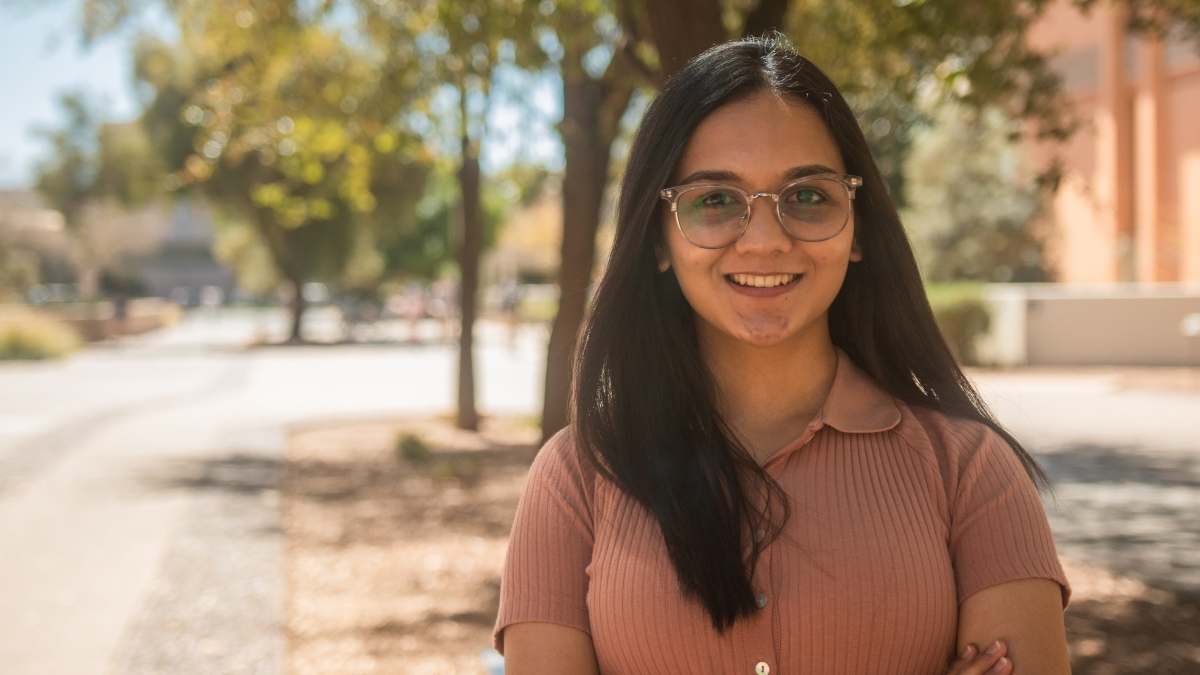Undergraduate psychology researcher hopes to uncover solutions to depression in military populations

Rishika Shah, an undergraduate researcher in four labs in the Department of Psychology, hopes to understand the underlying mechanisms behind behavior and attention. Photo by Robert Ewing/ASU
Rishika Shah, an undergraduate researcher in four labs in the Department of Psychology at Arizona State University, hopes to understand the underlying mechanisms behind behavior and attention.
Shah was announced as the recipient of the Dariel Truter Overby Memorial Scholarship, which is given annually to psychology students who aim to help people and pursue a graduate degree.
Shah currently conducts research with the Military Social Science Laboratory (MiSSile) and Associate Professor Rebecca Blais; in the Behavioral Alcohol Research for Clinical Advancement (BARCA) lab with Professor William Corbin; in the ADAPT project with Professor Abigail Gewirtz; and in the Memory and Control Lab with Associate Professor Gene Brewer.
Shah is also the president of the Psychology Engagement Team and the secretary of the Psych for All committee, a DEIB (diversity, equity, inclusion and belonging) initiative within the department.
Shah recently presented her honors thesis poster at the AZPURCAZPURC stands for Arizona Psychology Undergraduate Research conference. student research conference and has been working with the MiSSile Lab to better understand depression and social support in military populations.
The MiSSile Lab conducts research on individual and interpersonal outcomes associated with military-related traumas, including combat and sexual assault/harassment, and post-traumatic stress disorder.
Military populations endure intense stress that is unfamiliar to the regular population. As a result, many military families deal with reintegration issues and long-term depression. According to the National Alliance on Mental Illness, nearly one in four active military service personnel have experienced some form of mental health condition. Additionally, a 2014 study by JAMA Psychiatry found that veterans deal with PTSD at 15 times the rate of civilians.
“I'm doing my thesis on depression and social support in military populations,” Shah said. “We found a gap in literature where the association of negative social interactions with depression has not been studied in military populations. Negative social support is essentially critical remarks, promising help but not engaging in helpful behaviors and other forms of insensitive behaviors. Since social support has always been thought of as a protective factor to reduce depressive symptoms, it is important that we study both its positive and negative facets of it to better inform clinical interventions to treat depression. We hypothesize that negative social interactions affect depression more than positive social support.”
Shah transferred from a university in Mumbai in the late portion of 2021 and immediately went to work ingraining herself in the research culture of the Department of Psychology.
“Rishika is an intrepid scholar, who has sought and taken all opportunities she can. She is quick on her feet and thorough,” Blais said. “Her future is bright — I am honored to be part of her academic journey.”
In India, Shah was the editor of St. Xavier’s College’s psychology magazine and helped to organize literary and cultural festivals there. Additionally, she was the chairperson of the Indian Delegation at the Harvard College in Asia Program. Shah also helped to tutor elementary students in English with the Udisha Project.
Shah recognized that the theoretical approach to research in Mumbai limited her hands-on opportunities to conduct research, and she made the difficult decision to transfer to ASU. She was motivated by the idea of finding her own research niche and building a wealth of knowledge prior to applying for graduate programs.
“I first started with Dr. Blais at the MiSSile Lab, which is a military psychology lab where I am doing my honors thesis on depression and social support in military populations. And after that, I started working with Dr. Corbin at the BARCA Lab, which is a substance use lab, where I'm working on a cannabis research project,” Shah said.
Her positive experiences in the MiSSile and BARCA labs encouraged her to continue adding research roles and to continue her growth as a psychology researcher. Each lab conducts research in slightly different ways and from different perspectives, and combining them allows Shah to further refine what niche she intends on researching long-term.
“Additionally, I get to work as an undergraduate research coder in the ADAPT lab at the REACH Institute here at ASU and also in Dr. Brewer’s lab, where I run experiments by administering current stimulation through electrodes and assisting in other ways,” Shah said. “The common ground in all of these labs and in the department is how supportive the climate is everywhere. The graduate students, my professors and even my fellow research assistants all want to set you up for success.”
Shah hopes to join a clinical psychology doctoral program and is interested in conducting research on substance use in vulnerable populations such as military service members, veterans and other cognitive impairments from traumatic brain injury, PTSD and depression.
More Science and technology

Will this antibiotic work? ASU scientists develop rapid bacterial tests
Bacteria multiply at an astonishing rate, sometimes doubling in number in under four minutes. Imagine a doctor faced with a…

ASU researcher part of team discovering ways to fight drug-resistant bacteria
A new study published in the Science Advances journal featuring Arizona State University researchers has found…

ASU student researchers get early, hands-on experience in engineering research
Using computer science to aid endangered species reintroduction, enhance software engineering education and improve semiconductor…